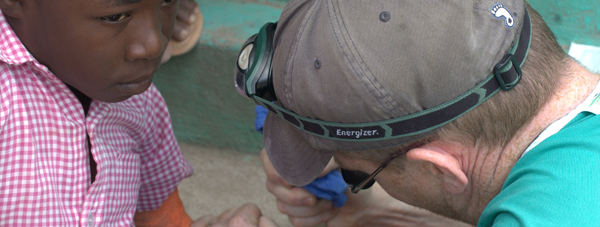Written by: Andrew Patterson
Everyone knows what having a bad day means, right? We have all had them. We get chewed out at work, or we get a speeding ticket, or the online order we placed is going to be a few days too late and life becomes inconvenient. Some bad days are worse than others. The death of a loved one, the loss of a job, being told by our doctor we are sick, or having a good friend move far away. All of us have had days like this. Bad days are hard days, painful days, but luckily for most of us, they are few and far between.
In Haiti, January of 2013, I was having a bad day. It started off as a good day, in the usual fashion, a quick breakfast and off to the medical clinic. We had treated most of the orphans at Cambry in the days before and they were healthy, happy, and thriving. We found that the food program that supports the orphanage is working and that the orphan’s health has been significantly improved. All blessings.
Unfortunately, the surrounding community of Haitians, are not as lucky. I had a slew of patients I could only pray for. I spent almost a decade in emergency medicine and I never had a shift where I saw so many people I could not help.
It started with an infant girl, born on Christmas day. She was born with an abdominal defect called gastroschisis, which allows communication of the bowels to the outside of the abdomen. The child was clearly dehydrated and would not eat. After discussing the case with our surgeons and anesthesiologist, I cried with Tracy a seasoned ER nurse, as we explained through a translator that we could not help them and that her child was not going to live.
A young girl came to the clinic. She had been badly burned by a cooking fire as an infant. Her right arm was fused to her chest. She will never be able to effectively use her arm without multiple plastic surgeries. She won’t get this type of care in Haiti.
Then there was “an elderly man” fifty two years old, who had an inguinal hernia that obstructed his bladder. He had in indwelling urinary catheter that was obviously infected. If we took the catheter out, he would never be able to urinate again and would die. Leave it in and give antibiotics? That was the solution, even with knowing that without a surgery that we did not have the resources to perform, he will eventually become septic and be beyond medical help.
Next was a woman with lower abdominal pain. She had an obvious cervical cancer on exam. Even in the US, she would have a small chance at long term survival. In Haiti, she will live until she can’t eat anymore, and die with intractable abdominal pain.
During a break, while I was trying to hold it together outside the clinic, a family pulled up in a car. An old man sat in the front seat, unable to move his legs. He had no reflexes in his lower extremities and his family had been carrying him from place to place for the last 6 months. They had been to the hospital and had x-ray of his low back. In the US, he could have been treated before his problem progressed to this level. In Haiti, this man will never walk again.
We did all we could to ease the suffering of those we could not definitively help. Some steroids, some antibiotics, some pain medicine and many prayers, this is what we could provide. I found myself talking to God and asking please, no more, I can’t do this.
Then it happened. A small child was brought into the clinic by his parents. His house had collapsed, not from an earthquake or a hurricane, just shoddy construction. A wall had fallen on him. His parents told us that he had not moved his legs or arms in three days. He had life in his eyes, but the rest of his body was limp. We moved him to a bed to examine him. I must have expressed my concern for a spinal cord injury out loud, because I could hear the others working with me start to cry and pray. We undressed the child and did a full exam. His reflexes were intact. After a few sips of water and some pain medicine, we lifted him off the bed and pointed him in the direction of Adrianna, another of the physician assistants in our group who has been on multiple mission trips to Haiti. The child stood, wobbly at first, but then one step, two steps, and finally he walked across the room and into Adrianna’s waiting arms. He was dehydrated and in pain, but not crippled. We all cried tears of joy.
Miracles are the opposite of bad days. Some big, some small, but all of them remind us of God’s love. Witnessing a miracle big or small can change a person’s heart. All of those who have traveled to Cambry have witnessed miracles. The stories never seem to stop, from the magnificent seven, to the story of Lorens, or Titite, the blessings just keep coming. In one small corner of Haiti, the folks who have traveled there to help have made a difference in so many lives. Because of these miracles, big and small, I try not to have bad days anymore. I try to remember what having a bad day really means and that seeing and feeling God’s love can make even our worst days painless.
Andrew


